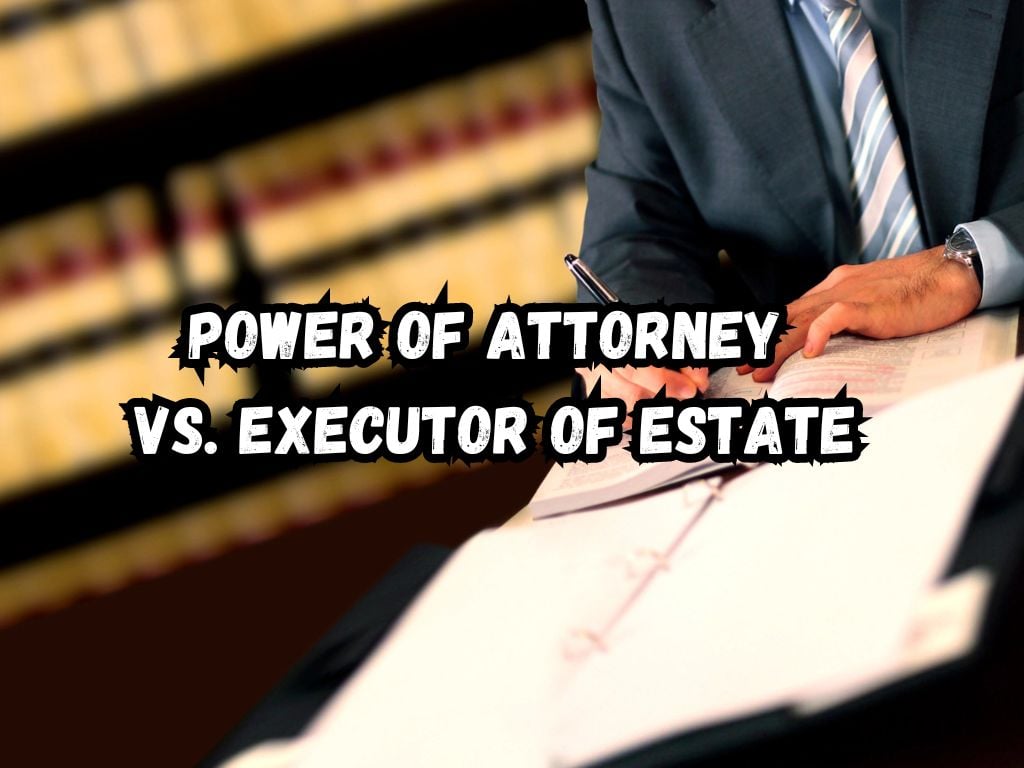When it comes to planning for the future, understanding the roles and responsibilities of legal authorities is crucial. Two key roles often discussed in estate planning are the Power of Attorney (POA) and the Executor of an Estate.
In this article, we will be diving deep into the Power of Attorney vs Executor of Estate debate, to find out the all the complexities about the two with regards to legal roles in estate strategies.
Both play significant roles in managing your affairs but at different times and under different circumstances.
What is a Power of Attorney?
A Power of Attorney is a legal document that grants one person or entity (the agent) the authority to act on behalf of another (the principal).
This role is active during the principal’s lifetime. The agent can manage financial, legal, or health decisions, depending on the scope specified in the document.
There are several types of POA. A General POA has broad authority, while a Durable POA remains in effect even if the principal becomes incapacitated.
A Springing POA becomes active only under conditions defined by the principal, often at the onset of incapacity.
The key responsibilities of a POA include managing financial affairs, making healthcare decisions, and handling legal matters, within the bounds of the POA document. However, they cannot change the principal’s will or make decisions after the principal’s death.

What is an Executor of an Estate?
An Executor is a person named in a will to manage the estate of the deceased. Their role begins after the death of the estate’s owner.
The executor’s job is to ensure that the deceased’s wishes, as expressed in their will, are carried out. This includes paying debts, distributing assets, and handling any legal claims against the estate.
Being appointed as an Executor usually requires confirmation by a court, even when named in the will.
Once confirmed, the Executor has the authority to gather and manage the estate’s assets, pay necessary taxes and debts, and distribute what remains according to the will.
Power of Attorney vs Executor of Estate: Comparison of Roles
Comparing an agent and the Executor of an Estate shows their functions and legal effectiveness differ markedly. An agent operates during the principal’s lifetime but loses their power on the principal’s death.
Conversely, an Executor has no legal standing while the will-maker is alive and gains their authority only after the will-maker’s death.
Choosing Between Power of Attorney and Executor
When planning your estate, consider the size and complexity of your assets, your health, and whom you trust to manage your affairs.
It’s common to appoint different people for each role, but one individual can serve as both, depending on your situation and preferences.
Here are a few considerations:
- Trust is paramount. Both roles require individuals who are responsible and whom you trust implicitly.
- Skills and willingness matter. Ensure your chosen agents are willing and able to perform their duties.
- Location can be a factor. Someone who lives closer may be more suited to manage day-to-day affairs as an agent.
Legal and Financial Implications
The selection of both an agent and an Executor come with significant legal and financial implications. Making the wrong choice could lead to disputes among family members or financial mismanagement.
It’s also vital to understand that any decision you make isn’t set in stone. Both agent and Executor appointments can be changed as long as the principal (for an agent) or the will-maker (for an Executor) is mentally competent to make those decisions.

Frequently Asked Questions
What happens if agent and Executor roles conflict?
Ideally, if both roles are active (in this case, if there’s a confusion around when the agent’s role ends and the Executor’s begins), it’s crucial to consult legal counsel to resolve misunderstandings and ensure actions are in the best interest of the estate or the principal.
Can the same person be both age t and Executor?
Yes, a single individual can be appointed to both roles. This can simplify decisions and actions, provided the appointed individual is trusted and capable of the responsibilities.
How can one revoke Power of Attorney or change an Executor?
A POA can be revoked by the principal at any time, provided they are mentally competent. Changing an Executor after a will has been made requires a codicil or creating a new will and can only be done by the will-maker while they are alive and competent.
Conclusion
Effective estate planning involves understanding the differences and functions of an agent and an Executor of Estate. Making informed decisions about who to appoint to these roles is critical.
Each has distinct responsibilities, and their selection should be made with care, considering the personal relationship, trust, and the ability of the individual to handle the appointed tasks.
Always consult with a legal advisor to ensure your estate planning fits your needs and wishes, providing peace of mind for you and your loved ones.


 Tags:
Tags:










